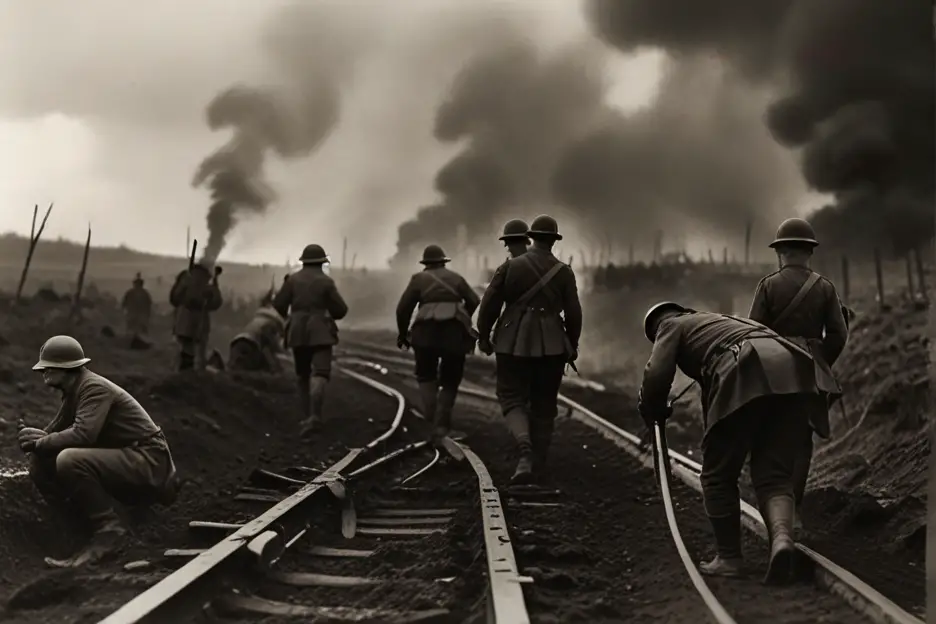
World War I was a crucial moment in history, marked by significant battles that profoundly influenced the course of the conflict and its aftermath.
In this article, we’ll delve into some of the most pivotal battles of World War I, examining their importance and enduring consequences.
5 Major Battles of World War I
The First Battle of the Marne (September 5-12, 1914)
The First Battle of the Marne occurred from September 5th to 12th, 1914, and stands as a crucial moment in World War I.
This battle marked the turning point in the German advance into France from Belgium.
Initially, the French army had been retreating towards Paris in what was termed the “Great Retreat.”
However, under the command of French Marshal Joseph Joffre, the French Sixth Army was ordered to counterattack, creating a 30-mile gap in the German lines.
During the battle, the Allies successfully defended their positions against German counterattacks, forcing the Germans into a retreat.
This victory effectively halted the German Schlieffen Plan, which aimed to swiftly capture Paris.
The outcome of the Battle of the Marne set the stage for the prolonged trench warfare that characterized the Western Front for the next four years.
- Read also: Understanding the Differences: World War I Vs World War II
- Read also: What would happen if World War 3 broke out?
The Battle of Verdun (February 21 – December 18, 1916)
From February 21st to December 18th, 1916, the Battle of Verdun unfolded, emerging as one of the most protracted and costly engagements of World War I.
The German offensive aimed to cripple France before diverting attention to Russia.
In response, French and British forces launched a counteroffensive, resulting in a stalemate.
This prolonged confrontation showcased the harrowing toll of modern warfare.
Additionally, the Battle of Verdun played a pivotal role in the emergence of modern Turkey.
Mustafa Kemal, later known as Atatürk, rose to prominence during this conflict, laying the groundwork for the foundation of modern Turkey.

The Battle of the Somme (July 1 – November 18, 1916)
The Battle of the Somme, which took place from July 1st to November 18th, 1916, holds the grim distinction of being the lengthiest and deadliest conflict of World War I, resulting in over 1 million casualties.
The primary objective for the Allies was to break through the entrenched stalemate of trench warfare.
However, despite their efforts, the battle ultimately failed to achieve a decisive victory.
One notable aspect of the Battle of the Somme was the significant contribution made by the Australian and New Zealand Army Corps (ANZAC) troops.
Their bravery and sacrifice during this grueling campaign are remembered with reverence.
Moreover, the Battle of the Somme underscored the futility of trench warfare, highlighting the staggering human cost and the limited strategic gains that could be attained through such tactics.
The Battle of Gallipoli (April 1915 – January 1916)
The Battle of Gallipoli unfolded from April 1915 to January 1916 as a joint effort by British, French, and Russian forces to gain control of the Dardanelles Straits.
Despite their concerted efforts, the campaign fell short of its objectives and resulted in significant casualties.
This defeat played a pivotal role in the establishment of modern Turkey.
Additionally, the Battle of Gallipoli highlighted the enduring qualities of endurance, determination, initiative, and ‘mateship’ among Australian and New Zealand soldiers.
The Battle of Jutland (May 31 – June 1, 1916)
The Battle of Jutland, which occurred from May 31st to June 1st, 1916, stands as the largest naval engagement of World War I.
It pitted the British and German fleets of ‘dreadnought’ battleships against each other in the North Sea.
Despite the immense scale of the battle, neither side achieved the decisive victory they had hoped for.
However, the outcome solidified British naval superiority and ensured control over crucial shipping lanes.
This strategic advantage played a significant role in the eventual defeat of Germany in 1918.

Long-Term Effects of The Major Battles of World War I
The major battles of World War I had profound and far-reaching effects that reshaped the political, economic, social, and technological landscape of the world:
Political changes
The war resulted in the downfall of several monarchies, including Russia, Austria-Hungary, Germany, and Turkey.
In their place, democratic governments emerged, marking a significant shift in political power structures.
Economic impact
The war severely disrupted European economies, leaving them in ruins.
Conversely, the United States emerged as the world’s leading creditor and industrial power, benefiting from increased production and trade during the conflict.
Social consequences
World War I contributed to the Bolshevik Revolution in Russia, leading to the establishment of a communist government.
It also fueled the rise of fascism in Italy, setting the stage for authoritarian regimes to gain power across Europe.
Additionally, the war saw atrocities such as the mass murder of Armenians in Turkey and the devastating influenza epidemic that claimed over 25 million lives worldwide.
Technological advances
The war ushered in a new era of warfare with the introduction of airplanes, tanks, long-range artillery, submarines, and poison gas.
These technological advancements revolutionized military strategy and tactics, shaping the nature of modern warfare.
Legacy of bitterness
The war left a lasting legacy of bitterness and resentment among nations, contributing to the conditions that led to World War II just two decades later.
The unresolved tensions and grievances from World War I fueled further conflict and instability in the years that followed.
Demographic and ritual crisis
The unprecedented scale of death and destruction during World War I brought about a profound shift in the way societies mourned and remembered the fallen.
The loss of millions of lives forced communities to grapple with new rituals and expressions of grief.
Redrawing of national boundaries
The war led to the dismantling of empires such as the Austro-Hungarian and Ottoman Empires, resulting in the creation of new nation-states and the redrawing of national boundaries across Europe and the Middle East.
These changes had long-lasting geopolitical implications for the region.

- Read also: Unveiling History: Civil War vs Revolutionary War
- Read also: Understanding the Effects of the Revolutionary War
Conclusion
These major battles of World War I played a crucial role in shaping the course of the war and its aftermath.
From the failure of the Schlieffen Plan at the Battle of the Marne to the devastating impact of trench warfare at the Battle of the Somme, these battles demonstrated the brutal reality of modern warfare and the resilience of the soldiers involved.


